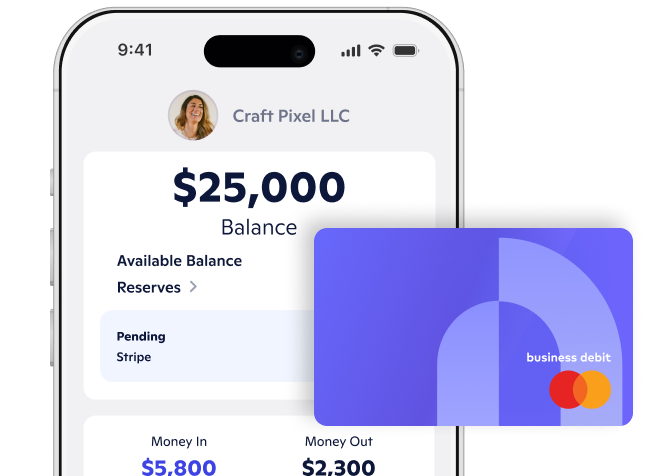
tarting a business bank account is a mostly easy and necessary step for new business owners. You need to complete the forms and give required documents according to what the bank asks.
A business account is essential for all businesses, regardless of size. It helps in keeping a clear distinction between personal and professional finances. You may be wondering what you need to open a business checking account.The checklist below will give the answer you’re looking for.
What Is a Business Checking Account?
A business checking account is similar to a personal one, except it serves as a central place for handling business money matters. It permits actions such as depositing and taking out cash, paying bills, and putting in checks. Business checking accounts have special characteristics intended to help entrepreneurs and freelancers.
Business checking accounts often have a requirement for higher minimum balances compared to personal accounts to avoid fees.
Business checking accounts come with benefits such as employee debit cards, free wire transfers, easy connection with accounting or payroll software, and the ability to receive card payments.
What Do I Need to Open a Business Checking Account?
Here is what you need to open a business checking account:
- Employer Identification Number (EIN)
Begin by acquiring an Employer Identification Number (EIN), or tax identification number. This is given and handled by the IRS. If you haven’t applied for an EIN, you can still open a business checking account using your personal Social Security number.
Whether you need an EIN or not depends on the type of your business. Usually, sole proprietorships without employees do not require an EIN, but LLCs might need one for various reasons. If you’re not sure, check the IRS checklist available on their website and get help from professionals.
- Initial Deposit
Once you have set up your business identity, you might need to make an initial deposit to open your business checking account. The needed starting deposit and minimum balance could vary based on bank policy and account type. The business checking account types include:
- Standard business checking account
- Interest-bearing business checking account
- Business savings account
- Non-profit business checking account
- Merchant services account
Consider a business bank account that matches your business's financial abilities in terms of initial deposit requirements and minimum daily balance. Work with the local business banker to decide on the amount of money you should put in for the first deposit.
3. Business & Personal Identification
To get a business bank account, you must show evidence of identification for yourself and your business. You can use your driver's license or passport as personal identification, whereas for the company, you can present documents like business licenses or agreements related to partnerships.
Additional requirements vary depending on your business structure:
- Sole proprietor
- LLC
- Limited liability partnership
How To Open a Business Bank Account Online
- Select the appropriate account type according to your business requirements, such as a checking account, savings account, or merchant account.
- Research reputable banks offering online business banking, comparing fees and features.
- Prepare necessary documents: ID, tax ID, and business formation papers.
- Complete online application forms accurately with personal and business details.
- Review and submit your application, allowing for a few days for bank review.
- Deposit initial funds once your application is approved.
Factors to Consider When Choosing an Online Business Bank
Features and Services
Evaluate the bank's offerings, such as online banking, mobile banking, bill pay, and remote deposit capture, to ensure they align with your business needs. If necessary, consider additional services like international wire transfers or cash management tools.
Fees
Understand the fee setup, which includes costs for managing the monthly account, charges for transactions made, ATM usage fees, a needed minimum balance, and other additional expenses. Make sure these fees are fair and fit your financial situation.
Interest Rates
Consider the interest rates offered, especially if you anticipate maintaining a significant balance in your account. Slight differences can impact your business's profitability.
Accessibility and Convenience
Opt for a bank that provides the opportunity to access through online banking or mobile apps, allowing you to monitor transactions and manage finances efficiently despite a busy schedule.
Benefits of a Business Bank Account
Easier Tax Preparation
Keeping a business bank account makes your tax preparation much easier. With the money coming in and going out through this account, you or the person handling your accounts can smoothly connect transactions with tax software. It makes filling in tax forms easier when you do it alone or have someone else do it for you. This can save time and reduce stress during the tax period.
People with a business account can divide their personal and business expenditures, which can improve the tax deduction process. Additionally, if your business is audited by the IRS, having a detailed record from your bank account acts as an organized audit trail, which helps reduce potential complications.
Easier Expense Tracking
Getting a business bank account boosts organization and eases keeping financial records and preparing for taxes. Identifying deductions is easier when you separate business transactions from your personal finances. Also, you can deduct any fees linked with having a business account as a valid business expense.
Protection From Business Debt Liability
The vital advantage you get from claiming your business as a corporation or an LLC is safeguarding personal assets in case of business debt. Unless you have engaged in activities that result in personal liability, such as illegal actions, creditors cannot legally pursue your personal assets if the company fails to meet its financial obligations.
But if you don't keep separate accounts for business and personal use, this protection can be weakened. If you mix your assets, it means that you could be personally responsible for the debts of your business. A judge might hold you accountable in court, leading to the possibility of losing all of your assets. Even though this isn't a pleasant thought, it highlights why opening a business bank account is so crucial to protect personal resources.
Explore the All-in-One Money Management Solution for Your Business
Online banking is quicker, automated, and provides comprehensive financial understanding. No more monthly fees, minimum balances, or waiting in bank lines.
With Novo's online banking platform, you can handle your finances with ease and convenience, all with a few clicks on any internet-connected device. Tracking your cash flow is a breeze with advanced features like custom reports and software connections.
Novo Platform Inc. strives to provide accurate information but cannot guarantee that this content is correct, complete, or up-to-date. This page is for informational purposes only and is not financial or legal advice nor an endorsement of any third-party products or services. All products and services are presented without warranty. Novo Platform Inc. does not provide any financial or legal advice, and you should consult your own financial, legal, or tax advisors.
Novo is a fintech, not a bank. Banking services provided by Middlesex Federal Savings, F.A.: Member FDIC.






